大学英语精读第一册
大学英语精读第一册单词词汇表.
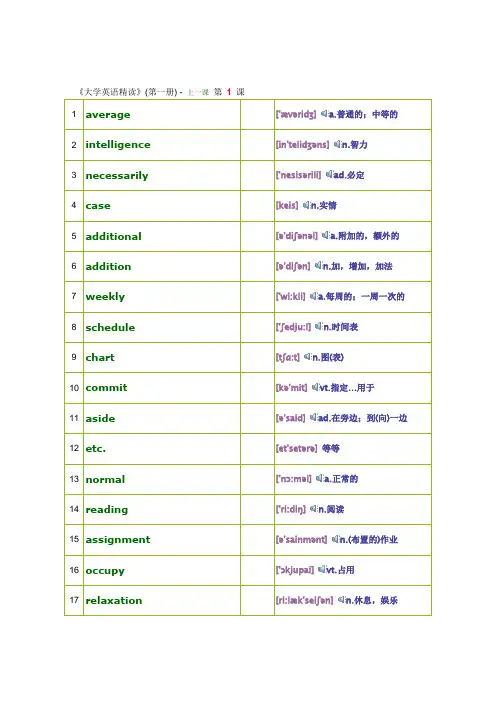
a.ad.单独的(地) [əd'ventʃə] ['səuləu] n.冒险(活动) a.单独的
2
3
4
[ˌtrænzət'læ ntik] a.横渡大西洋的 [lʌŋ] n.肺 n.癌
5
6
['kæ nsə]
7
[di'tə:mind] a.下定了决心的 [di'tə:min] v.决定,使下定决心 n.决心, 果断, 意志
在别的时候;平时 在附近;即将来临 在附近;即将来临 毕竟,终究 对…有把握,确信 拿起,捡起
1
worthwhile program programme
[ˌwə:θ'wail] 的;有价值的
a.值得花时间(或精力)
2
['prəugræ m]
n.节目
3
['prougræ m] n.节目
4
educational current social movie nevertheless propose
3
4
n.实情 a.附加的,额外的 n.加,增加,加法 a.每周的;一周一次的 n.时间表 n.图(表) vt.指定…用于 ad.在旁边;到(向)一边
5
[ə'diʃənəl] [ə'diʃən] ['wi:kli] ['ʃedju:l] [tʃɑ:t] [kə'mit] [ə'said]
6
7
8
9
10 commit 11 aside 12 etc. 13 normal 14 reading 15 assignment 16 occupy 17 relaxation
['relətiv]
大学英语精读一(上海外语教育出版社)
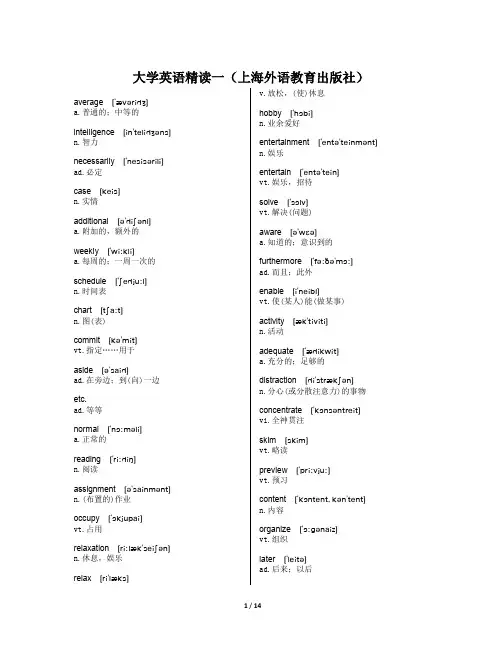
give up 放弃
be determined to (do) 决心(做)
(all) by oneself (完全地)独立地
in spite of 尽管;虽然
by far ……得多
turn over (使)翻倒,(使)倾覆
can not help 禁不住
3 / 14
relative ['rel4tiv] n.亲属,亲戚
broadcasting ['br3:dk1sti6] n.广播
prohibit [pr4'hibit] vt.禁止
proposal [pr4'p4uz4l] n.提议,建议
actually ['1ktju4li] ad.实际上
generation ['d9en4'rei54n] n.(一)代
gap [g1p] n.缺口,间隙;分歧,隔阂
determined [di't4:mind] a.下定了决心的
retire [ri'tai4] vi.退休
voyage [v3id9] n.航海;航行
route [ru:t] n.路线
clipper ['klip4] n.快速帆船
crew [kru:]
2 / 14
n.全体船员;全体乘务员
steer [sti4] vt.为……掌舵;驾驶
at other times 在别的时候;平时
round/around the corner 在附近;即将来临
after all 毕竟,终究
be sure of 对……有把握,确信
pick up 拿起,捡起
worthwhile ['w4:7'wail] a.值得花时间(或精力)的;有价值的
大学英语精读第一册Unit-1-The-dinner-Party
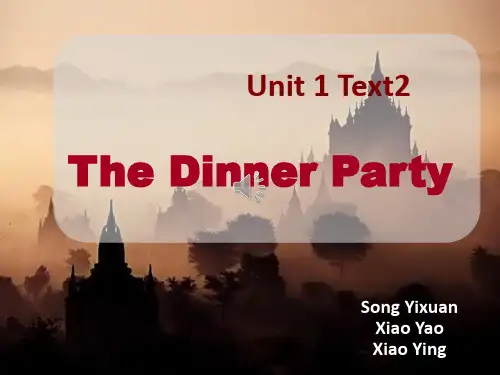
1 2 3
Warm-up Questions
Background Information Activities Text Text Analysis
New words and Phrases
4
5 6
Frailty, thy name is woman!——William Shakespeare
The Dinner Party
Read in
• General Reading
narrative text
Time
during the colonial period
General Reading
Characters a colonial official and his wife, and
• 4.In the discussion, the young girl points out that women are braver than men. • F • The girl only means women are now braver than they were in the past. • 5. When the American naturalist notices a strange expression coming over the hostess’ face, he immediately knows that there is a snake in the room. • F • It is not until he sees the boy place a bowl of milk on the veranda that he knows that.
大学英语精读第三版(上海外语教育出版社 董亚芬主编)第一册 Book1
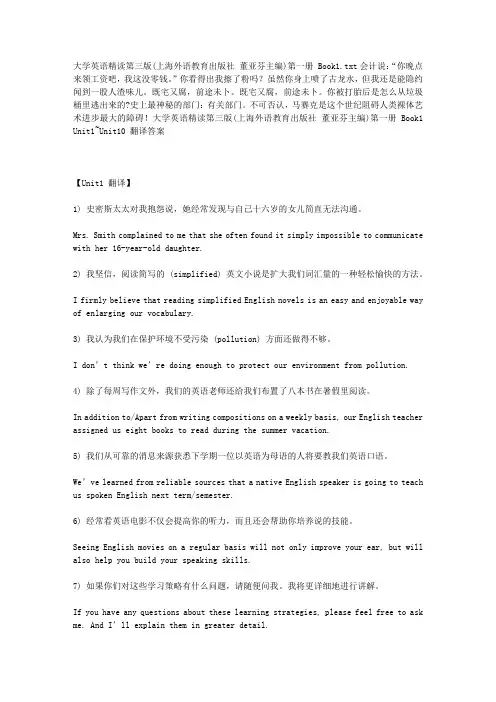
大学英语精读第三版(上海外语教育出版社董亚芬主编)第一册 Book1.txt会计说:“你晚点来领工资吧,我这没零钱。
”你看得出我擦了粉吗?虽然你身上喷了古龙水,但我还是能隐约闻到一股人渣味儿。
既宅又腐,前途未卜。
既宅又腐,前途未卜。
你被打胎后是怎么从垃圾桶里逃出来的?史上最神秘的部门:有关部门。
不可否认,马赛克是这个世纪阻碍人类裸体艺术进步最大的障碍!大学英语精读第三版(上海外语教育出版社董亚芬主编)第一册 Book1 Unit1~Unit10 翻译答案【Unit1 翻译】1) 史密斯太太对我抱怨说,她经常发现与自己十六岁的女儿简直无法沟通。
Mrs. Smith complained to me that she often found it simply impossible to communicate with her 16-year-old daughter.2) 我坚信,阅读简写的 (simplified) 英文小说是扩大我们词汇量的一种轻松愉快的方法。
I firmly believe that reading simplified English novels is an easy and enjoyable way of enlarging our vocabulary.3) 我认为我们在保护环境不受污染 (pollution) 方面还做得不够。
I don’t think we’re doing enough to protect our environment from pollution.4) 除了每周写作文外,我们的英语老师还给我们布置了八本书在暑假里阅读。
In addition to/Apart from writing compositions on a weekly basis, our English teacher assigned us eight books to read during the summer vacation.5) 我们从可靠的消息来源获悉下学期一位以英语为母语的人将要教我们英语口语。
大学英语精读第一册全部答案
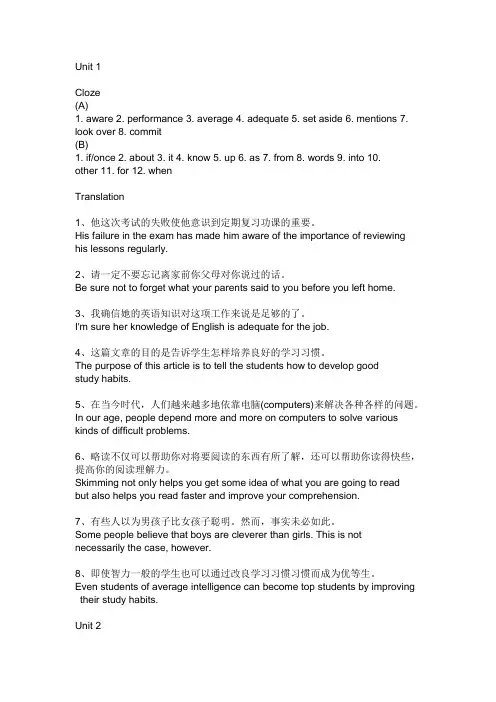
Unit 1Cloze(A)1. aware2. performance3. average4. adequate5. set aside6. mentions7. look over8. commit(B)1. if/once2. about3. it4. know5. up6. as7. from8. words9. into 10.other 11. for 12. whenTranslation1、他这次考试的失败使他意识到定期复习功课的重要。
His failure in the exam has made him aware of the importance of reviewing his lessons regularly.2、请一定不要忘记离家前你父母对你说过的话。
Be sure not to forget what your parents said to you before you left home.3、我确信她的英语知识对这项工作来说是足够的了。
I'm sure her knowledge of English is adequate for the job.4、这篇文章的目的是告诉学生怎样培养良好的学习习惯。
The purpose of this article is to tell the students how to develop goodstudy habits.5、在当今时代,人们越来越多地依靠电脑(computers)来解决各种各样的问题。
In our age, people depend more and more on computers to solve various kinds of difficult problems.6、略读不仅可以帮助你对将要阅读的东西有所了解,还可以帮助你读得快些,提高你的阅读理解力。
Skimming not only helps you get some idea of what you are going to readbut also helps you read faster and improve your comprehension.7、有些人以为男孩子比女孩子聪明。
大学英语精读第一册答案
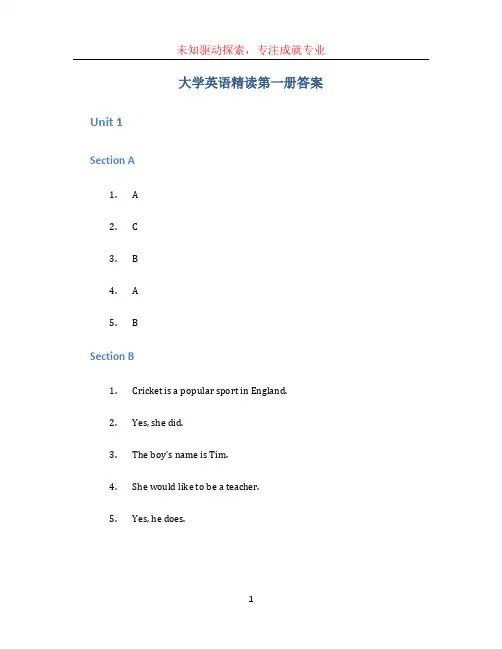
大学英语精读第一册答案Unit 1Section A1. A2. C3. B4. A5. BSection B1.Cricket is a popular sport in England.2.Yes, she did.3.The boy’s name is Tim.4.She would like to be a teacher.5.Yes, he does.Unit 2Section A1. B2. C3. A4. C5. BSection B1.He is going to buy a new car.2.No, he wasn’t.3.The concert was on Saturday.4.She goes to the gym twice a week.5.Yes, she did.Unit 3Section A1. A3. B4. A5. BSection B1.The movie starts at 7 p.m.2.Yes, she does.3.He was at home doing homework.4.No, they don’t.5.She wants to visit Paris.Unit 4Section A1. C2. A3. B4. BSection B1.She is going to visit her grandparents.2.He had a delicious lunch at a local restaurant.3.No, they aren’t.4.Yes, he did.5.He wants to become a doctor.Unit 5Section A1. B2. C3. A4. C5. BSection B1.He likes to play basketball.2.No, she can’t.3.It is a science fiction novel.4.Yes, it does.5.They are going to have a picnic in the park. Unit 6Section A1. B2. C3. A4. C5. BSection B1.He is going to take a vacation to Bali.2.No, she wasn’t.3.It is a romantic comedy movie.4.Yes, they did.5.She wants to learn how to play the guitar. Unit 7Section A1. B2. A3. C4. B5. CSection B1.She is going to a party with her friends.2.They had a barbecue in the backyard.3.No, he didn’t.4.Yes, he is.5.He wants to study abroad.Unit 8Section A1. C2. A3. B4. B5. CSection B1.She is going to buy new clothes.2.No, she wasn’t.3.The book is about history.4.Yes, they are.5.He wants to become an engineer. Unit 9Section A1. C3. B4. B5. CSection B1.They are going to watch a movie at the cinema.2.No, they can’t.3.The party is on Friday.4.Yes, she is.5.She wants to become a journalist.Unit 10Section A1. C2. A3. B4. BSection B1.He is going to visit his parents.2.Yes, he did.3.They played soccer in the park.4.No, they aren’t.5.He wants to start his own business. 以上为《大学英语精读第一册》习题答案。
大学英语精读第一册
⼤学英语精读第⼀册英语专业本科《综合英语》授课教案第⼀册Lesson Plan For Contemporary College English(BookⅠ)Lesson 1 Half a Day By Naguib MahfouzⅠ.教学内容1. 热⾝;2.作者:教育与背景;主要著作;创作观;3.作品赏析:结构分析;如何赏析⽂学作品;扩展式讨论;4.写作技巧:省略疑问句和修辞疑问句;倒装句;―with‖独⽴结构;5.语⾔理解:长难句解析;核⼼词汇学习;介词练习;构词法:前缀;6.课堂讨论;7.练与讲。
Ⅱ.教学⽬的1. 了解作者及其背景知识;2.熟悉本⽂使⽤的写作⼿法;3.掌握修辞疑问句、倒装句等修辞⼿法;4.熟练掌握三类构词法;5.通过深刻理解⽂章内涵,培养学⽣社会洞察⼒和相关的讨论能⼒,同时掌握⽂中的核⼼语⾔点。
Ⅲ.教学重点与难点1. ⽂学作品的赏析;2.⽂学中的修辞⼿法――省略疑问句和修辞疑问句;倒装句;―with‖独⽴结构;3.构词法:前缀;4.课⽂的写作背景与主题。
Ⅳ.教学⽅法采⽤讲授、问答、讨论、模仿、练习、多媒体等⽅法对学⽣进⾏启发式教学。
Ⅴ.教学过程Step1. Question Discussing for Warming-up (10 minutes)Step2. Background Information (40 minutes)1. Naguib Mahfouz——Education & Background(纳吉布?马福兹所受教育和⼀般背景)Naguib Mahfouz was born on the 11th Dec. 1911 in an old quarter of Cairo, the youngest son of a merchant. He studied philosophy at King Faud I (now Cairo) University, graduating in 1934. He worked in university administration and then in 1939 he worked for the Mini-stry of Islamic Affairs. He was later Head of the State Cinema Organisation at the Ministry of Culture. He also worked as a journalist. Although widely translated, his works are notavailable in most Middle Eastern countries because of his support of Sadat's Camp David initiative. In 1994 he survived an assassination attempt by Islamic extremists. He is married, has two daughters and lives in Cairo.He died on Aug. 30, 2006. Naguib Mahfouz —— important works(纳吉布?马福兹的主要著作)●Naguib Mahfouz was the first Arab to win the Nobel prize for literature, in 1988. He hasbeen described as “a Dickens of the Cairo cafés ”and “the Balzac of Egypt”.●He is now the author of no fewer than 30 novels, more than 100 short stories, and more than200 articles. Half of his novels have been made into films which have circulated throughout the Arabic-speaking world.●Mahfouz began writing when he was 17. His first novel was published in 1939 and tenmore were written before the Egyptian Revolution of July 1952, when he stopped writing forseveral years. One novel was republished in 1953, however, and the appearance of The Cairo Trilogy in 1957 made him famous throughout the Arab world as a depictor of traditionalurban life.●Works of his second writing period:The Children of Gebelawi (1959)The Thief and the Dogs (1961)Autumn Quail (1962)Small Talk on the Nile (1966)Miramar (1967)several collections of short stories.3. Naguib Mahfouz —— how he pictures the world(作者笔下的世界:⽆尽的拼搏与悲剧的⼈⽣)The picture of the world as it emerges from the bulk of Mahfouz's work is very gloomy indeed, though not completely despondent. It shows that the author's social utopia is far from being realized. Mahfouz seems to conceive of time as a metaphysical force of oppression. His novels have consistently shown time as the bringer of change, and change as a very painful process, and very often time is not content until it has dealt his heroes the final blow of death.To sum up, in Mahfouz's dark tapestry of the world there are only two bright spots. These consists of man's continuing struggle for equality on the one hand and the promise ofscientific progress on the other; meanwhile, life is a tragedy.Step3. Text Appreciation (50 minutes)1. Structure of the text (10 minutes)The text can be conveniently divided into three parts. In the first part (para.1-7), we learn about the boy‘s misgivings about school. He found it hard to be away from home and mom, and thought school was punishment. The second part (para.8-16) describes how the boy felt about school. He found that life at school was rich and colorful in many ways, although it also required discipline and hard work. In the last part of the text, the boy walked out of the school to find that the outside world had changed beyond measure and that he had grown into an old man.2. How to appreciate literature (15 minutes)Plot of the story:Setting of the story:Protagonist v.s. Antagonists:Drama of the story lies in:Writing technique: (Have you ever read a story using the similar technique?)Theme of the story:3. Further discussion (15 minutes)A. Read the following suggestions made by the father. Which ones do you agree with andwhich ones not? Have you ever been given some suggestions by your parents when entering the university? List them out.1) School is a place that make useful men out of boys.2) Don‘t you want to be useful like your brothers?3) Put a smile on your face and be a good example to others.4) Be a man.5) Today you truly begin life.B From the description between Para.8 and Para.16, we can see different aspects of school life.Try to list as many aspects as possible in the following table.C In the last part of the text, the boy walked out of the school to find that the outside worldhad changed beyond measure. How might he feel about the changes? List exact words that support your choice. D.After-class thinkingAfter reading the story, do you feel emotionally or spiritually touched? Why or why not?Step4. Writing devices(30 minutes)1.Elliptical question(省略疑问句)“Why school?” I asked my father. e.g.A: Headmaster: We want you to go and tell the boy‘s parents the news.B: Teacher: Why me?Father: We‘ll go to Tianjin this weekend.Daughter: What for?/ Why this weekend?/Why Tianjin?2.Rhetorical question(修辞疑问句)“What have I done?”Don’t you want to be useful like your brothers? e.g.Can‘t you see I‘m busy? (Don‘t disturb me!)What good is a promise for an unemployed worker?Does nothing ever worry you?Please give more examples.3. Inverted sentences(倒装句)… here and there stood conjurers showing off their tricks, or making snakes appear frombaskets.Conjurers stood everywhere. They were showing off their tricks or making snakes appear from baskets.More examples:There are some exceptions to this reaction.Were there no air on the earth, there would be no life on it.In no case should we waste our time.There goes the bell.Away hur ried the customers.4. “with” absolute structure(with‖独⽴结构)Then there was a band ..., with clowns and weight lifters walking in front.More examples:He stood there with a stick in his hand. (with + n. + prep.)Paul soon fell asleep with the light still burning. (with + n. + participle)She can‘t go out with all these dishes to wash. (with + n. + to do.)He was lying on the bed with all his clothes on. (with + n. + adv. )Step5. Language Understanding (60 minutes)1. Sentence Paraphrase (20 minutes)1) They did not make me happy, however, as this was the day I was to be thrown into schoolfor the first time.(What does ―they‖ refer to?What does the narrator imply by using ―to be thrown into school‖? )2)My mother stood at the window watching our progress, and I turned towards her from time totime, hoping she would help.(What does ―progress‖ mean here?What kind of help could his mother offer?What does the sentence tell us about the boy‘s relationships with his parents?)3) a street lined with gardens …:a st reet where there are gardens … along both sideslined with …: past participle phrase used here to modify ―a street‖. It can be regarded as a relative clause cut short, eg.a novel (that was) written by Charles Dickens/personal computers (that are) made inChina4.) I did not believe there was really any good to be had in tearing me away from my home andthrowing me into the huge, high-walled building.There is no good to be had in doing sth.It is no good/use doing sth.5).from each floor we were overlooked by a long balcony roofed in wood.:… on one side of the courtyard was a building with a long wood-roofed balcony on each floor where we could be seen. Or … from the balcony on each floor of the building people could see the pattern into which we formed.6) Well, it seemed that my misgivings had had no basis.:Well, perhaps my doubt, worry and fear about what school would be like were all groundless.OrWell, it seemed that I was wrong to think that school was a dreadful place.7.) In addition, the time for changing one‘s mind was over and gone and there was no question ofever returning to the paradise of home.:There is no question (of doing): there is no possibilityBesides, it was impossible for us to quit school and return to the good old days when we stayed home playing and fooling around all day. Our childhood was gone, never to come back.8.)Nothing lay ahead of us but exertion, struggle, and perseverance.:nothing but: onlyWe would have to do our best and keep working very hard until we finished school. This is what I imagined our school days would be like. OrThe kind of life that was waiting for us at school would be full of exertion, struggle andperseverance.9.)Those who were able took advantage of the opportunities for success and happiness thatpresented themselves.:to present itself/ themselves: (formal) to appear, happenIf there came opportunities, capable students would seize them to achieve success andhappiness.2 Word Study (20 minutes)1.) to make sb./sth. (out) of sb./sth.It‘s a place that makes useful men out of boys.(make boys become useful men) eg.The army made a man of him.He said the Government were frightened of nothing. The real trouble was we were making a mountain out of a molehill.2.) There is no good to be had in doing sth.:It is no good/use doing sth.e.g. There is no good to be had in buying a boat when you don‘t have enough spare time to use it.It‘s no good crying over spilt milk.It is worth doing well what is worth doing.it is no (not much) goodit is no (not any, hardly any, little) useit is uselessit is not the slightest useit is worth(worthwhile)there is no (no good, no use)There is no denying that women are playing an important role in the world today.3.) to tear sb. away from a place:to (make sb.) leave a place or a person unwillingly because one has to eg. Can‘t you tear yourself away from the TV for dinner?4). to cling to sth.:to hold tightly; not release one‘s grip oneg. The little child clung to his mother for comfort.Some of the victims of the fire climbed out of the building, clung to the window ledges for a minute or two and then dropped to their death a hundred feet below.She still clings to the belief that her son is alive.5.) burst into (tears, sobs; laughter, a guffaw, song):begin, suddenly and/or violently, to cry, laugh, sing etc.eg. Aunt Annabel, who has been nervous and jumpy lately, suddenly burst into tears.As the comic got into his stride, the audience burst into hoots of laughter.cf.:The aircraft turned on its back and burst into flames.The orchards seemed to have burst into blossom overnight.I mentioned the incident later to a tailor friend and he burst out laughing/crying.6) sort people into ranks:put ... in order; arrangee.g. They sorted the apples according to size into large ones and small ones.cf.:She spent a happy afternoon sorting out her coins and stamps.It‘s no good standing back and waiting for things to sort themselves out.7).to resort to: to make use of ; to turn to sth. (esp. sth. bad) as a solution eg.e.g. Terrorists resorted to bombing city centers as a means of achieving their political aims.These are means we have never resorted to to obtain information.8).to present oneself: to appear, happeneg. When the chance to study at Harvard presented itself, I jumped at it.He was ordered to present himself at the chairman‘s office at nine o‘clock next morning.Step6. In-class discussion and presentation (40 minutes)1. If you had only half a day left to live, what would you most want to do? List the top five things you would do and give us your reason.2. Suppose the narrator found his home at last. What would happen after that?3. Work in group. Make up your own story of ―Half a Day‖ and perform it.Step7 Textbook exercises (70 minutes)1. In-class news report2. In-class dictation 3.P.11-P. 21 (Contemporary College English 1)Step8 Homework1. Paraphrase the following sentences taken from the text.1).We were formed into an intricate pattern in the great courtyard surrounded by high buildings.2)……; from each floor we were overlooked by a long balcony roofed in wood.3.) Well, it seemed that my misgivings had had no basis.4.) Our path, however, was not totally sweet and unclouded.5.) It was not all a matter of playing and fooling around.6.) Rivalries could bring about pain and hatred or give rise to fighting.7.) In addition, the time for changing one‘s mind was over and gone and there was no question ofever returning to the paradise of home.8.) Nothing lay ahead of us but exertion, struggle, and perseverance.9.) Those who were able took advantage of the opportunities for success and happiness thatpresented themselves.10). How did these hills of rubbish find their way to cover its surface?2Pick out idiomatic expressions in the text as many as possible.( write the English phrase and their Chinese meanings)(p13 on the textbook)3. Write a composition with at least 150 words. The title is “My First Day atCollege”.Ⅵ. 教学反思Unit 2 Going HomeⅠ.教学内容1. 热⾝;2.作者:教育与背景;主要著作;社会背景;3.作品赏析:结构分析;如何赏析⽂学作品;扩展式讨论;4.写作技巧:现在分词和过去分词;if条件状语从句;5.语⾔理解:长难句解析;核⼼词汇学习;构词法;6.课堂讨论;7.练与讲。
大学英语精读第一册
大学英语精读第一册大学英语精读第三版(上海外语教育出版社董亚芬主编)第一册Book1 Unit9答案1)extremely2)hazard3)pollute4)originally5)feasibility6)survive7)atmosphere8)conclusion9)proceed10)conference11)billion12)humorous1)had paid attention to2)notice3)had noticed4)Pay attention to5)noticed6)attention has been paid to1)cost2)spend3)cost4)spend5)paid6)had been paid7)pay8)pay9)cost10)has spend1)polluted2)feasibility3)conclusion hazard4)known as5)giving off6)satellite7)based on8)planets9)deadly10)originally11)sticking up12)proceeded13)as to14)smashed/was smashed/got smashed15)has set back/will set back16)For one thing for another1)The earth's surface is mostly composed of water.2)Ice and snow on the roads both create hazards for drivers during theChristmas season.3)The youngest child survived the earthquake, but the rest of the family died.4)Crime has made some streets in American cities unfit to live.5)Several cars crashed into each other on the highway due to the fog.6)The rider of the motorbike made a signal with his arm fora left turn.1)acceptance2)guide3)appearance4)performance5)arrive6)proposal7)depend8)refuse9)difference10)remove11)disturb12)signa13)exist14)survive15)conference16)insist1)dressmaker2)troublemaker3)weedkiller4)recordholder5)timekeeper6) a person who owns land7) a person who sells books8) a person whose work is building ships9) a person whose job is to drive a taxicab10)an instrument for opening cans1)friendly2)deadly3)daily4)lovely5)manly6)lonely7)weekly8)motherly1)Henry couldn't take part in the sports meet because of his broken leg.2)We were sorry to hear that Mr. Davidson had to retire at the age of fiftybecause of his poor health.3)They didn't go to the concert because of the heavy snow.4)It was because of the noise that I couldn't fall asleep.1)It is rather difficult to pronounce.2)It is easy to explain as far as I know.3)It is as difficult to manage as Henry's.4)It will be fit to wear if you shorten the sleeves.5)To tell the truth, it is impossible to answer.6)It is not possible to see in advance.1)as far as I am concerned2)As far as we students are concerned3)As far as the method itself is concerned4)As far as ability is concerned5)as far as the acting and music are concerned6)As far as the structure is concerned1)feasibility2)based on3)conclusions4)unfit5)polluted6)deadly7)atmosphere8)extremely9)For another10)survive11)set back12)proceed1)he2)it3)danger4)problem5)different6)but7)others8)changing9)that10)continue11)ourselves12)future13)ask14)people15)world16)today17)necessary 18)environment 19)world20)in21)around 22)prevent 23)at24)protect 25)everyone26)save1)polluted2)die out3)shallow4)pipes5)reach6)fruit7)most important of all8)atmosphere9)survive10)endure翻译1)工厂和汽车排出的一氧化碳一类气体严重污染了大气。
大学英语精读第一册(第三版)答案
大学英语精读第三版(上海外语教育出版社董亚芬主编)第一册答案Book 1 Unit 1Study&Practice V ocabulary Activities1.1)e 2)g 3)j 4)a 5)b 6)i 7)c 8)d 9)h 10)f2.1) handling2) summarized3) process4) absorb5) are bound to6) feel free7) for instance8) strategies9) complained10) has committed... to memory11) Nevertheless12) rely... on13) Apart from14) command3.1) over and over again2) at a time3) put it into practice4) watching out for5) by no means6) concentrate on7) In addition to8) in detailEnriching Y our Word Power1.1)action2)employ3)announce4)examination5)communication6)express7)compose8)improvement9)concentration10)management11)consider12)motivate13)development14)movement15)discuss16)operate17)division18)production19)educate20)repeat2.1) a) additional b) add c) addition d) addition2) a) effectively b) effect c) effective d) effect3) a)helpful b) help c) helpless d) help e) helplessly f) helpfully g) helpful4) a) reliant b) reliable c) reliance, reliable d) relies e) reliably5) a) repetition b) repeating c) repeatedly d) repeated e) repetitionUsage1) In my opinion2) According to Mary3) In our opinion4) According to today’s papers5) In most doctors’ opinion ( According to most doctors)Structure1.1) Shakespeare was not only a dramatist but also an actor.2) Miss Crain not only took me home in her car, but also came the next day to see if I had recovered.3) Hainan Island attracts tourists not only in winter but also in summer.4) There is always a black market not only in Britain, but also in other European countries.5) At the Athens Olympics in 2004, Liu Xiang not only won a gold medal in the 110-meter hurdles, but also broke the Olympic record.2.1) It is true that your sentences are all gr ammatically correct, but they don’t make any sense.2) It is true that they lost that battle, but they still went on fighting.3) It is true that Tom’s very clever and hardworking, but I still don’t think he is the right person for the job.4) It is true that learning English is by no means easy, but we can make the task easier by using some learning strategies.Cloze1.1) strategies2) frequently3) over and over again4) commit to memory5) acquaintance6) watch out for7) communicate8) process9) opportunities10) rely on11) put into practice12) absorbed2.1) if2) about3) it4) know5) up6) as7) addition8) even9) into10) other11) for12) whileSpot Dictation1) memorize2) a matter of3) taught4) shelf5) realize6) written7) idiomatic8) join in9) difference10) gain a good commandTranslation1) 史密斯太太对我抱怨说,她经常发现与自己十六岁的女儿简直无法沟通。
大学英语(精读)第一册Unit1
1)_A_s_k_y_o_u_r_t_e_a_c_h_e_r _q_u_e_s_ti_o_n_s_b_e_f_o_re_,_d_u_r_in_g__a_n_d_a_f_te_r_c_l_a_ss_._______ 2)_S_p_e_a_k_t_o_a__fo_r_e_ig_n_e_r_.____________________________________ 3)_L_is_t_e_n_t_o_a_n__E_n_g_li_s_h_r_a_d_io__p_ro_g_r_a_m_._________________________ 4)_W__a_tc_h__a_n_E_n_g_l_is_h__m_o_v_ie_._________________________________ 5)_R_e_a_d__a_n_E__n_g_lis_h__a_rt_ic_l_e_o_n__th_e__In_t_e_rn_e_t_. _____________________ 6)_U_s_e__E_n_g_li_s_h_s_o_f_tw_a_r_e_.___________________________________ 2. _B_e__w_il_lin_g__to__m_a_k_e__m_i_s_ta_k_e_s_i_n_o_r_d_e_r_t_o_le_a_r_n__o_r _c_o_m_m__u_n_ic_a_te_._________ 3. _U_s_e_c_o_n_t_e_x_t _to__u_n_d_e_rs_t_a_n_d_. ____________________________________
- 1、下载文档前请自行甄别文档内容的完整性,平台不提供额外的编辑、内容补充、找答案等附加服务。
- 2、"仅部分预览"的文档,不可在线预览部分如存在完整性等问题,可反馈申请退款(可完整预览的文档不适用该条件!)。
- 3、如文档侵犯您的权益,请联系客服反馈,我们会尽快为您处理(人工客服工作时间:9:00-18:30)。
英语专业本科《综合英语》授课教案第一册Lesson Plan For Contemporary College English(BookⅠ)Lesson 1 Half a Day By Naguib MahfouzⅠ.教学内容1. 热身;2.作者:教育与背景;主要著作;创作观;3.作品赏析:结构分析;如何赏析文学作品;扩展式讨论;4.写作技巧:省略疑问句和修辞疑问句;倒装句;―with‖独立结构;5.语言理解:长难句解析;核心词汇学习;介词练习;构词法:前缀;6.课堂讨论;7.练与讲。
Ⅱ.教学目的1. 了解作者及其背景知识;2.熟悉本文使用的写作手法;3.掌握修辞疑问句、倒装句等修辞手法;4.熟练掌握三类构词法;5.通过深刻理解文章内涵,培养学生社会洞察力和相关的讨论能力,同时掌握文中的核心语言点。
Ⅲ.教学重点与难点1. 文学作品的赏析;2.文学中的修辞手法――省略疑问句和修辞疑问句;倒装句;―with‖独立结构;3.构词法:前缀;4.课文的写作背景与主题。
Ⅳ.教学方法采用讲授、问答、讨论、模仿、练习、多媒体等方法对学生进行启发式教学。
Ⅴ.教学过程Step1. Question Discussing for Warming-up (10 minutes)Step2. Background Information (40 minutes)1. Naguib Mahfouz——Education & Background(纳吉布•马福兹所受教育和一般背景)Naguib Mahfouz was born on the 11th Dec. 1911 in an old quarter of Cairo, the youngest son of a merchant. He studied philosophy at King Faud I (now Cairo) University, graduating in 1934. He worked in university administration and then in 1939 he worked for the Mini-stry of Islamic Affairs. He was later Head of the State Cinema Organisation at the Ministry of Culture. He also worked as a journalist. Although widely translated, his works are notavailable in most Middle Eastern countries because of his support of Sadat's Camp David initiative. In 1994 he survived an assassination attempt by Islamic extremists. He is married, has two daughters and lives in Cairo.He died on Aug. 30, 2006.Naguib Mahfouz —— important works(纳吉布•马福兹的主要著作)●Naguib Mahfouz was the first Arab to win the Nobel prize for literature, in 1988. He hasbeen described as “a Dickens of the Cairo cafés ”and “the Balzac of Egypt”.●He is now the author of no fewer than 30 novels, more than 100 short stories, and more than200 articles. Half of his novels have been made into films which have circulated throughout the Arabic-speaking world.●Mahfouz began writing when he was 17. His first novel was published in 1939 and tenmore were written before the Egyptian Revolution of July 1952, when he stopped writing forseveral years. One novel was republished in 1953, however, and the appearance of The Cairo Trilogy in 1957 made him famous throughout the Arab world as a depictor of traditionalurban life.●Works of his second writing period:The Children of Gebelawi (1959)The Thief and the Dogs (1961)Autumn Quail (1962)Small Talk on the Nile (1966)Miramar (1967)several collections of short stories.3. Naguib Mahfouz —— how he pictures the world(作者笔下的世界:无尽的拼搏与悲剧的人生)The picture of the world as it emerges from the bulk of Mahfouz's work is very gloomy indeed, though not completely despondent. It shows that the author's social utopia is far from being realized. Mahfouz seems to conceive of time as a metaphysical force of oppression. His novels have consistently shown time as the bringer of change, and change as a very painful process, and very often time is not content until it has dealt his heroes the final blow of death.To sum up, in Mahfouz's dark tapestry of the world there are only two bright spots. These consists of man's continuing struggle for equality on the one hand and the promise ofscientific progress on the other; meanwhile, life is a tragedy.Step3. Text Appreciation (50 minutes)1. Structure of the text (10 minutes)The text can be conveniently divided into three parts. In the first part (para.1-7), we learn about the boy‘s misgivings about school. He found it hard to be away from home and mom, and thought school was punishment. The second part (para.8-16) describes how the boy felt about school. He found that life at school was rich and colorful in many ways, although it also required discipline and hard work. In the last part of the text, the boy walked out of the school to find that the outside world had changed beyond measure and that he had grown into an old man.2. How to appreciate literature (15 minutes)Plot of the story:Setting of the story:Protagonist v.s. Antagonists:Drama of the story lies in:Writing technique: (Have you ever read a story using the similar technique?)Theme of the story:3. Further discussion (15 minutes)A. Read the following suggestions made by the father. Which ones do you agree with andwhich ones not? Have you ever been given some suggestions by your parents when entering the university? List them out.1) School is a place that make useful men out of boys.2) Don‘t you want to be useful like your brothers?3) Put a smile on your face and be a good example to others.4) Be a man.5) Today you truly begin life.B From the description between Para.8 and Para.16, we can see different aspects of school life.Try to list as many aspects as possible in the following table.C In the last part of the text, the boy walked out of the school to find that the outside worldhad changed beyond measure. How might he feel about the changes? List exact words that support your choice.D.After-class thinkingAfter reading the story, do you feel emotionally or spiritually touched? Why or why not?Step4. Writing devices(30 minutes)1.Elliptical question(省略疑问句)“Why school?” I asked my father. e.g.A: Headmaster: We want you to go and tell the boy‘s parents the news.B: Teacher: Why me?Father: We‘ll go to Tianjin this weekend.Daughter: What for?/ Why this weekend?/Why Tianjin?2.Rhetorical question(修辞疑问句)“What have I done?”Don’t you want to be useful like your brothers? e.g.Can‘t you see I‘m busy? (Don‘t disturb me!)What good is a promise for an unemployed worker?Does nothing ever worry you?Please give more examples.3. Inverted sentences(倒装句)… here and there stood conjurers showing off their tricks, or making snakes appear frombaskets.Conjurers stood everywhere. They were showing off their tricks or making snakes appear from baskets.More examples:There are some exceptions to this reaction.Were there no air on the earth, there would be no life on it.In no case should we waste our time.There goes the bell.Away hur ried the customers.4. “with” absolute structure(with‖独立结构)Then there was a band ..., with clowns and weight lifters walking in front.More examples:He stood there with a stick in his hand. (with + n. + prep.)Paul soon fell asleep with the light still burning. (with + n. + participle)She can‘t go out with all these dishes to wash. (with + n. + to do.)He was lying on the bed with all his clothes on. (with + n. + adv. )Step5. Language Understanding (60 minutes)1. Sentence Paraphrase (20 minutes)1) They did not make me happy, however, as this was the day I was to be thrown into schoolfor the first time.(What does ―they‖ refer to?What does the narrator imply by using ―to be thrown into school‖? )2)My mother stood at the window watching our progress, and I turned towards her from time totime, hoping she would help.(What does ―progress‖ mean here?What kind of help could his mother offer?What does the sentence tell us about the boy‘s relationships with his parents?)3) a street lined with gardens …:a st reet where there are gardens … along both sideslined with …: past participle phrase used here to modify ―a street‖. It can be regarded as a relative clause cut short, eg.a novel (that was) written by Charles Dickens/personal computers (that are) made inChina4.) I did not believe there was really any good to be had in tearing me away from my home andthrowing me into the huge, high-walled building.There is no good to be had in doing sth.It is no good/use doing sth.5).from each floor we were overlooked by a long balcony roofed in wood.:… on one side of the courtyard was a building with a long wood-roofed balcony on each floor where we could be seen. Or… from the balcony on each floor of the building people could see the pattern into which we formed.6) Well, it seemed that my misgivings had had no basis.:Well, perhaps my doubt, worry and fear about what school would be like were all groundless.OrWell, it seemed that I was wrong to think that school was a dreadful place.7.) In addition, the time for changing one‘s mind was over and gone and there was no question ofever returning to the paradise of home.:There is no question (of doing): there is no possibilityBesides, it was impossible for us to quit school and return to the good old days when we stayed home playing and fooling around all day. Our childhood was gone, never to come back.8.)Nothing lay ahead of us but exertion, struggle, and perseverance.:nothing but: onlyWe would have to do our best and keep working very hard until we finished school. This is what I imagined our school days would be like. OrThe kind of life that was waiting for us at school would be full of exertion, struggle andperseverance.9.)Those who were able took advantage of the opportunities for success and happiness thatpresented themselves.:to present itself/ themselves: (formal) to appear, happenIf there came opportunities, capable students would seize them to achieve success andhappiness.2 Word Study (20 minutes)1.) to make sb./sth. (out) of sb./sth.It‘s a place that makes useful men out of boys.(make boys become useful men) eg.The army made a man of him.He said the Government were frightened of nothing. The real trouble was we were making a mountain out of a molehill.2.) There is no good to be had in doing sth.:It is no good/use doing sth.e.g. There is no good to be had in buying a boat when you don‘t have enough spare time to use it.It‘s no good crying over spilt milk.It is worth doing well what is worth doing.it is no (not much) goodit is no (not any, hardly any, little) useit is uselessit is not the slightest useit is worth(worthwhile)there is no (no good, no use)There is no denying that women are playing an important role in the world today.3.) to tear sb. away from a place:to (make sb.) leave a place or a person unwillingly because one has to eg. Can‘t you tear yourself away from the TV for dinner?4). to cling to sth.:to hold tightly; not release one‘s grip oneg. The little child clung to his mother for comfort.Some of the victims of the fire climbed out of the building, clung to the window ledges for a minute or two and then dropped to their death a hundred feet below.She still clings to the belief that her son is alive.5.) burst into (tears, sobs; laughter, a guffaw, song):begin, suddenly and/or violently, to cry, laugh, sing etc.eg. Aunt Annabel, who has been nervous and jumpy lately, suddenly burst into tears.As the comic got into his stride, the audience burst into hoots of laughter.cf.:The aircraft turned on its back and burst into flames.The orchards seemed to have burst into blossom overnight.I mentioned the incident later to a tailor friend and he burst out laughing/crying.6) sort people into ranks:put ... in order; arrangee.g. They sorted the apples according to size into large ones and small ones.cf.:She spent a happy afternoon sorting out her coins and stamps.It‘s no good standing back and waiting for things to sort themselves out.7).to resort to: to make use of ; to turn to sth. (esp. sth. bad) as a solution eg.e.g. Terrorists resorted to bombing city centers as a means of achieving their political aims.These are means we have never resorted to to obtain information.8).to present oneself: to appear, happeneg. When the chance to study at Harvard presented itself, I jumped at it.He was ordered to present himself at the chairman‘s office at nine o‘clock next morning.Step6. In-class discussion and presentation (40 minutes)1. If you had only half a day left to live, what would you most want to do? List the top five things you would do and give us your reason.2. Suppose the narrator found his home at last. What would happen after that?3. Work in group. Make up your own story of ―Half a Day‖ and perform it.Step7 Textbook exercises (70 minutes)1. In-class news report2. In-class dictation 3.P.11-P. 21 (Contemporary College English 1)Step8 Homework1. Paraphrase the following sentences taken from the text.1).We were formed into an intricate pattern in the great courtyard surrounded by high buildings.2)……; from each floor we were overlooked by a long balcony roofed in wood.3.) Well, it seemed that my misgivings had had no basis.4.) Our path, however, was not totally sweet and unclouded.5.) It was not all a matter of playing and fooling around.6.) Rivalries could bring about pain and hatred or give rise to fighting.7.) In addition, the time for changing one‘s mind was over and gone and there was no question ofever returning to the paradise of home.8.) Nothing lay ahead of us but exertion, struggle, and perseverance.9.) Those who were able took advantage of the opportunities for success and happiness thatpresented themselves.10). How did these hills of rubbish find their way to cover its surface?2Pick out idiomatic expressions in the text as many as possible.( write the English phrase and their Chinese meanings)(p13 on the textbook)3. Write a composition with at least 150 words. The title is “My First Day atCollege”.Ⅵ. 教学反思Unit 2 Going HomeⅠ.教学内容1. 热身;2.作者:教育与背景;主要著作;社会背景;3.作品赏析:结构分析;如何赏析文学作品;扩展式讨论;4.写作技巧:现在分词和过去分词;if条件状语从句;5.语言理解:长难句解析;核心词汇学习;构词法;6.课堂讨论;7.练与讲。
